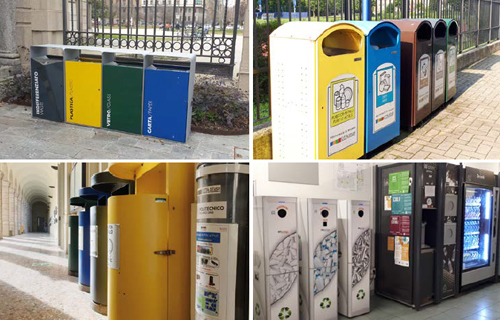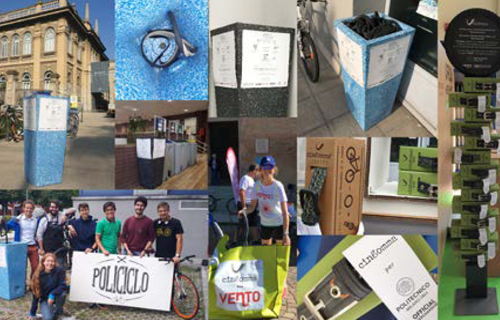Strategic Programme
Politecnico di Milano, through the Campus Sostenibile ‘Environment’ line of action, aims to improve the management of resources and waste, encouraging practices such as reuse, recycling and waste separation. These activities can be broadly divided into resource management and waste management.
Resource management

Sustainable resource management is a central objective at Politecnico di Milano. Besides relying on food suppliers with a low environmental impact, multiple actions are carried out on campuses:
Cingomma project
Sustainable vending machines
NoPaper project
PoliCiclo workshop
Waste management

Politecnico aims to improve efficiency in the waste management and collection system. In order to achieve this result, the University has for some time been equipped with suitable infrastructures for the recycling of all types of waste produced, and has subsequently launched an intensive systematic awareness and information campaign. Key actions around waste management include:
Exhausted batteries collection
ZeroZeroToner project
Umido project
Industrial eco-efficiency
Climate change, environmental pollution, resource scarcity are the contemporary challenges that call for urgent transition towards circular economy and sustainable development. Industrial Eco-Efficiency (IEE) drives this transition through decoupling economic growth from environmental impact and resource consumption.
This course is delivered in the following Degree Programmes:
- Management Engineering
- Communication Design
SYSTEM DESIGN FOR SUSTAINABILITY
The students will be able to design Sustainable Product-Service System (S.PSS), with a focus on Distributed Economies (DE), i.e., win-win business/offer models where the economic interest of the provider/s continuously seeks environmentally and/or socioethically beneficial new solutions.
This course is delivered in the following Degree Programmes:
- Product Service System Design
- Integrated Product Design
- Interior and Spatial Design
- Design for the Fashion System
- Communication Design
- Digital and Interaction Design
- Management Engineering
ECOLOGY AND SUSTAINABILITY OF PRODUCTION SYSTEMS
On the one hand, the course aims to provide students with an overview of the major environmental issues on a global scale, with particular regard to the effects of human activities on ecological systems. On the other hand, the course will address the issue of environmental assessment on a local scale, providing the basic knowledge for assessing the impact of projects and land use planning on different environmental matrices and the socio-economic system. Finally, the main decision-support tools will be critically analysed in contexts characterised by the presence of multiple objectives.
This course is delivered in the following Degree Programmes:
- Energy Engineering
- Environmental and Land Planning Engineering (BSc)
- Environmental and Land Planning Engineering (MSc)
RAPCON
RAPCON – Recycled Asphalt Pavement Concrete aims to evaluate the performances of concrete made with RAP, reducing the amount of wasted asphalt and limiting the consumption of natural aggregates.
Scientific Coordinator: Elena Redaelli
re-netta
Re-NetTA Re-Manufacturing Networks for Tertiary Architectures contributes to apply circular economy in the building sector, focusing on tertiary sector building components, characterized by rapid obsolescence and temporary uses
Scientific Coordinator: Cinzia Talamo
DESIGN FOR SUSTAINABILITY AND ICT
Design for sustainability and ICT: a household prototype for waste water recycling focuses on experimental application of interaction design methodologies and digital technologies to foster the transition towards sustainability in the framework of a wider interdisciplinary research about the development of a system for recycling water at home to grow edible plants.
Scientific Coordinator: Fiammetta Costa

